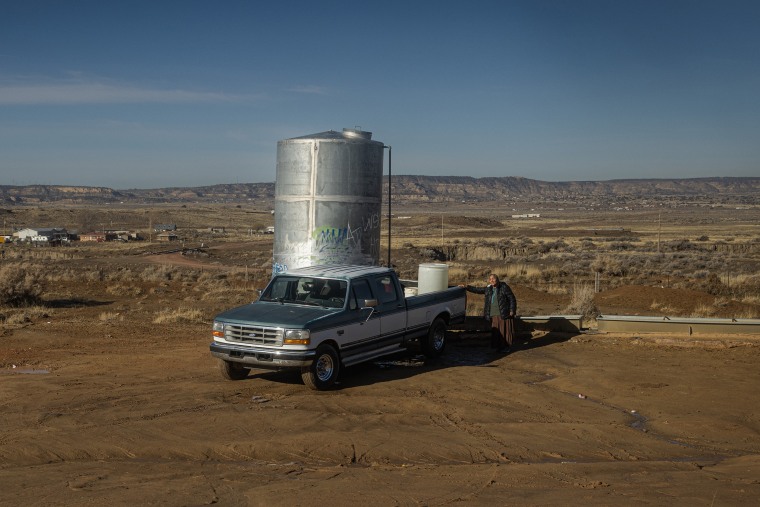WASHINGTON — The Supreme Court on Thursday ruled against the Navajo Nation over claims that the federal government has failed to assert the tribe's desperate need for water access in the arid West.
The justices, divided 5-4, said a lawsuit the tribe filed against the federal government must be thrown out.
Writing for the majority, Justice Brett Kavanaugh said that an 1868 treaty with the Navajo Nation did not require the U.S. government to take active steps to secure water access.
"And it is not the judiciary's role to rewrite and update this 155-year-old treaty," he added.
Conservative Justice Neil Gorsuch joined the three liberal justices in dissent.
The tribe was merely asking the federal government to identify its water rights and was not seeking dramatic further steps, Gorsuch wrote.
As tribal members have had to do throughout their difficult history, "they must fight again for themselves to secure their homeland and all that must necessarily come with it," he wrote.
Buu Nygren, president of Navajo Nation, said in a statement that although the ruling was disappointing, he was encouraged that four justices sided with the tribe. He pledged to continue efforts to obtain water rights to the lower basin of the Colorado River in Arizona.

"My job as the president of the Navajo Nation is to represent and protect the Navajo people, our land, and our future. The only way to do that is with secure, quantified water rights to the Lower Basin of the Colorado River," Nygren said.
The lack of water and infrastructure to pipe it across the vast reaches of the more than 17 million-acre reservation — larger than the state of West Virginia — which straddles parts of Arizona, New Mexico and Utah, remains one of the biggest challenges facing Navajo leaders.
The tribe says the federal government has failed to keep promises and left tribe members to suffer even as the Colorado River runs directly along the reservation's border and provides water for surrounding states.
For Andrew Curley, a Navajo member whose research as a professor at the University of Arizona focuses in part on the relationship between Native American tribes and the federal government on resources like water, the ruling was expected.
"It’s not surprising that the Supreme Court, a colonial court, would side with a colonial government," he said. "The power is stacked against tribes in this scenario."
The case touches upon the complex array of agreements and court decisions that over the decades have dictated how the waters of the Colorado River, divided into upper and lower sections, are allocated among the states. Further complicating matters, the Colorado River system is already depleted due to long-term drought conditions, with the longer-term threat of climate change also looming.

The tribe wants rights to waters in the lower Colorado River that flows along the Navajo reservation’s northwestern border.
The court, which has a 6-3 conservative majority, heard two consolidated appeals — one brought by the federal government and another by the states of Arizona, Nevada and Colorado, in addition to several California water districts.
The dispute is over whether the government had a legal duty that the tribe can enforce in court. The tribe, which signed the key treaty with the federal government in 1868, argued that under its agreements with the federal government that assured it would have access to land, it was assumed that the government also had a duty to ensure it had necessary water.
The tribe argued that it is not seeking a decision on rights to the lower Colorado River specifically. Instead, its lawyers said that the federal government’s oversight of the entire Colorado River, as well as its duties to the tribe, meant that it was required to do a full assessment of the Navajo Nation’s water rights, which may affect how water from the Colorado River is allocated.
Now, one option for Navajo Nation would be to seek to reopen long-running litigation over the allocation of Colorado River water that the Supreme Court itself oversaw as part of its role adjudicating disputes between states. The tribe filed a motion to intervene in that case decades ago and was denied.
In Thursday's ruling, the court left open the possibility of the tribe intervening in water rights cases, a point that Gorsuch seized upon in his dissenting opinion.
“After today, it is hard to see how this court (or any court) could ever again fairly deny a request from the Navajo to intervene in litigation over the Colorado River or other water sources to which they might have a claim,” he wrote.
The surrounding states pointed out they are already implementing a 2007 agreement on water shortages as well as a drought contingency plan adopted in 2019.
Rita Maguire, a lawyer who represented the nearby states at the Supreme Court, said the ruling "makes it clear that the federal government can have no trust duty to a tribe without clear direction by treaty or Congress." Because the Navajo treaty did not require it, the federal government has no duty to secure water.
The Department of the Interior said in a statement that the federal government is "committed to upholding its trust and treaty obligation to tribes, as well as to ensuring that water rights for Colorado River users are fulfilled according to the law."
The Navajo Nation can access water from other sources, including the San Juan River, a tributary of the Colorado River, but the tribe says that is not enough. Many tribal members do not have access to running water and rely on wells and other localized water sources.
The tribe can also seek funding from Congress for specific projects.
Navajo Nation originally sued the federal government in 2003 seeking access to the main branch of the lower Colorado River, with the litigation dragging on ever since. In separate litigation in state court, the tribe has fought for access to the Little Colorado River, another tributary of the Colorado River.
A previous attempt to settle Navajo claims to the lower Colorado River failed about a decade ago.
The Biden administration and the three states appealed the Supreme Court after the San Francisco-based 9th U.S. Circuit Court of Appeals ruled in favor of the tribe in 2021, saying it could sue the government for an alleged failure to carry out its duties on behalf of the tribe.
